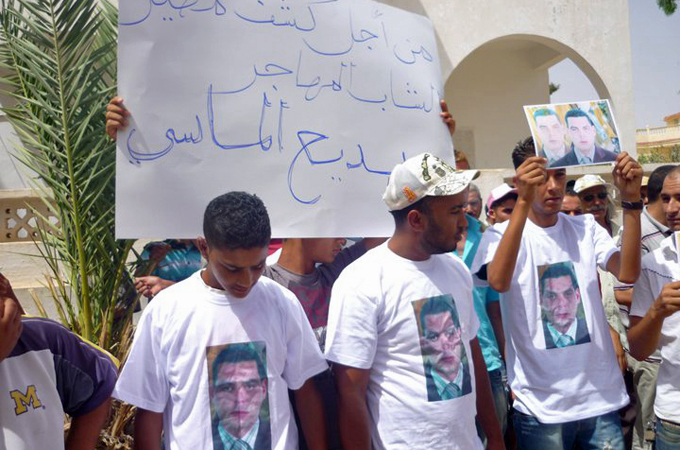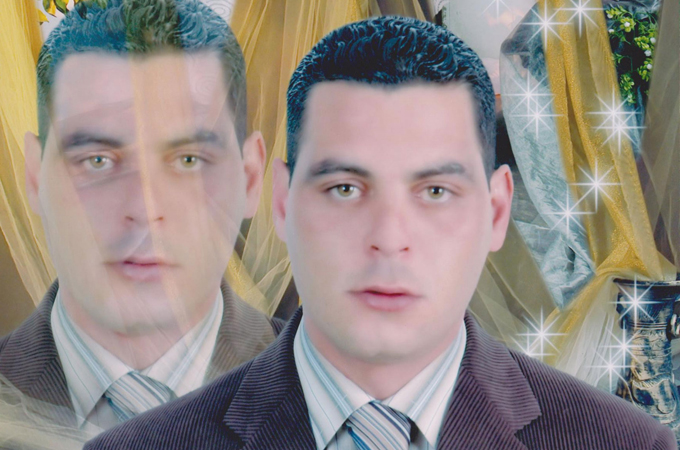Suffocating to death in France’s ageing jails
Prisoner dies and cellmate hospitalised after fire tears through cell in “decrepit” 19th century French jail.

 |
| Tunisian protesters demand answers after El Massi remained locked in a French prison cell as a fire blazed [Ridha Ezdini] |
Within hours of being arrested by French police on minor drug-related charges, Walid Ferdi was dead.
His cellmate, Badiaa El Massi, a Tunisian migrant arrested for living in France without a residency permit, lies in an artificial coma in a hospital bed in the town of Tours. Doctors say he is unlikely to survive long.
The two men had the misfortune of being held in the ageing Fresnes Prison, south of Paris, where, as prison authorities confirmed to Al Jazeera, there is no functioning fire alarm system.
Investigating police maintain that El Massi set his younger cellmate alight. El Massi’s family and lawyer, however, argue that it is more likely the two men set fire to their mattress as a form of protest against their detention.
Following an autopsy that revealed no traces of violence on his body, Ferdi’s family is pressing for homicide charges to be levelled against whoever in the prison is found responsible, on the grounds that his death was caused by poor safety and the guards’ failure to react to the fire promptly.
Just how long the two men were locked in the 9m2 cell, breathing in the fire’s deadly fumes on the evening of June 30 is not yet clear, but the medical evidence suggests prolonged exposure to the smoke.
Ferdi, a French citizen born to Algerian parents and raised in the 18th arrondissement of Paris, died of smoke inhalation. It was the first time he had been arrested. His alleged crime was to have sold a small amount of cannabis resin, a local website reported [FR].
The 22-year-old died in the prison not long after the cell door was opened and efforts to revive him failed. Al Jazeera was unable to reach his family or lawyer.
El Massi has 45 per cent third-degree burns to his body, but doctors at the Trousseau Hospital told family members that, shoud he die, it would most probably be because of the extensive damage endured by his respiratory system. His kidneys have collapsed and he is on dialysis. Medical staff treating him declined to speak to Al Jazeera directly.
France’s prisons are widely viewed as some of the most dilapidated in the Western world.
While the French government does not collect data on ethnicity or religion, those familiar with the prison system estimate more than half of the country’s prison population is of North African origin.
Like those before them, the penitentiary system’s two latest victims have received little sympathy or attention from the either the French establishment or the public at large, aside from a few brief articles that left the men nameless.
One comment [FR] on the website of left-leaning Liberation sums up what appears to be the general view:
“It’s a shame. One of them is still alive. Two less [prisoners alive] would have been better,” wrote one reader under the pseudonym “Goulache”.
Antiquated prisons
Fresnes was an architectural innovation when it was built in the 1890s, but more recently, little has been done to bring it up to contemporary health and safety standards.
Nowadays, it is more often described as “decrepit”.
|
Along with the notorious La Sante and Fleury-Merogis, Fresnes is one of the three main prisons in the Paris region, and the second largest prison in France.
For years, France’s prisons have drawn scathing condemnation from national and international bodies, including both the European Court of Human Rights and the European Committee for the Prevention of Torture, for failing to respect detainees’ rights for basic living standards.
Successive governments have introduced several reforms to the penitentiary system, beginning in the early 1980s.
The country was shocked when Dr Veronique Vasseur, a doctor at La Sante prison, wrote a book a decade ago detailing the appalling conditions in which prisoners were forced to live.
Policies to construct new facilities and improve existing ones were passed in 2002 and again in 2009.
But the system’s critics argue that the emphasis has been on building more facilities, while little effort has been made to improve conditions in older prisons like Fresnes and La Sante.
“They think in terms of repression,” Soumaya Taboubi, the lawyer for El Massi’s family, says, questioning the lack of safety norms in Fresnes.
The National Advisory Commission on Human Rights (CNCDH by its French acronym) wrote in its 2010 report to the United Nations Committee against Torture that it was “concerned by the fact that France’s response to the [prison] problem focuses primarily on increasing the country’s prison capacity”.
The CNCDH argues that the authorities’ failure to tackle the systemic failures of the prison regime is directly related to an increase in violence against others, self-mutilation and suicide amongst detainees.
France has one of the highest rates of prison suicide in Europe, and figures from the National Advisory Commission on Human Rights show that the number has been rising annually since 2006.
There have been more than 50 suicides in French prisons so far this year, according to BAN Public, a Paris-based NGO that lobbies on issues related to imprisonment.
El Massi’s family rule out suicide, and lawyers of both men dismiss the police’s claim that he deliberately set his cellmate alight, based on the the autopsy.
They maintain that the fire was most likely lit as a form of protest.
|
‘He’s a Tunisian without any French residency permit, they are not taking this case seriously and they will not sacrifice 20 prison guards for one Tunisian’ Ilhem El Massi, Badiaa’s sister |
Nameless officials
Al Jazeera spoke with the Creteil public prosecutor in charge of the initial internal investigation into the events surrounding the fire.
Despite being the only public official authorised to speak about the investigation, the public prosecutor refused to have her name appear in this article, on the grounds that Al Jazeera was “a media that I don’t like at all”.
She confirmed that there were no alarms inside cells and that staff inside the prison only became aware of the fire after guards in watchtowers outside noticed the flames through the cell window, and raised the alarm with their colleagues inside.
Despite this apparent delay, she maintained that, from the time the fire started to the time prison staff opened the cell door, “a few minutes, if that” had passed.
Whilst accepting that prisoners in Fresnes frequently light fires to get the attention of the guards, the public prosecutor dismissed the suggestion that the prison should have some form of functioning alarm system.
“Well, no, these are very old buildings, they are not at all adapted for that,” she said.
She emphasised that the fire was “clearly deliberate” and argued that El Massi took measures to block any smoke from leaving the cell.
The authorities at Fresnes denied Al Jazeera’s interview request due to the ongoing investigation. The prison administrator did, however, explain by phone that there were fire alarms in corridors, but not in individual cells.
Generally, the administrator said, staff rely on detainees in neighbouring cells to alert officers to any fires, because the solid doors prevent smoke emerging from cells.
“For the smoke to reach the corridor, it can take a long time,” she conceded, declining to comment further.
Francois Bes of the International Observatory on Prisons (OIP) said that, in Fresnes, prisoners often resort to lighting fires in order to attract the attention of otherwise unresponsive staff.
“It’s one of the means prisoners use to call for help,” he said.
Yet while fire alarms and other safety standards are reportedly being taken into account in the construction of new prisons, the same norms are not respected in the country’s older penitentiary institutions.
“If the watchtower guards could see the flames through the small cell window, that implies the fire was already very large,” Bes said.
Reform is key
Even once prison staff were aware of the fire, he said there is likely to have been a further delay before the doors were opened, since security guards are not permitted to carry keys to cells and must call in their superiors when there is an incident.
The public prosecutor, however, refutes the suggestion that there was any delay in the time it took to open the cell.
With one of the two men dead and the other in a coma on the verge of death, the only chance of an approximate account of the events in the cell that evening will depend on the investigation.
Taboubi, El Massi’s lawyer, says the authorities are trying to cover up what really happened, and that the case should immediately be referred to an independent judge.
The penitentiary authorities are known for their opacity, particularly when it comes to deaths within prison walls, said Taboubi.
It is standard practice for any initial investigation to be internally led, with the public prosecutor then referring it to the judicial authorities if they consider it necessary.
It is only at this point that an independent examining magistrate is appointed.
Francois Bes agrees that the internal investigations are “not always very thorough” and that for independent organisations such as the OIP, it can be difficult to learn what really happened behind prison walls.
El Massi’s family were only informed of his arrest and hospitalisation on July 8, by the police officer heading the investigation, who told them that the young man was hospitalised in Tours.
His immediate family is in his hometown of Redeyef, in the troubled region of Gafsa, south Tunisia.
Ismail Trabelsi, a relative, has been trying to obtain some kind of written document from the hospital so that El Massi’s parents can obtain a French visa to be near to their son during what are probably his last days.
|
But Trabelsi says the public prosecutor is preventing the hospital from providing the family with any such documents.
“Every time we ask for some kind of document, they say the same thing. That the public prosecutor told them not to give us anything,” Trabelsi told Al Jazeera.
Around two hundred people gathered in Paris on July 9 for a silent march in support of Walid Ferdi, calling for answers from the authorities.
There was also a protest in Redeyef on Monday, against the French government’s apparent disregard for El Massi, with more than a hundred people chanting “Sarkozy you coward, you can’t insult immigrants”.
A Facebook group in support of the Tunisian had drawn more than 1,900 members at the time of writing.
Moeheddine Cherbibe of the Tunisian Federation for Citizens of Two Shores (FTCR), a French NGO, said that French authorities should not be arresting people on the basis that they had not been granted French residency.
Cherbibe said El Massi was probably very perturbed after having been picked up at a police checkpoint at the Gare du Nord station in Paris, which might have pushed him to protest.
“We want a serious investigation, because no answers have been given and there isn’t even an investigating magistrate appointed to this case yet,” he said.
Trabelsi said that El Massi had been detained for migration-related issues in the Vincennes Detention Centre, on the western edge of Paris, but managed to escape. He had also spent several months previously in Fresnes Prison, under a false identity.
“He’s a Tunisian without any French residency permit, they are not taking this case seriously and they will not sacrifice 20 prison guards for one Tunisian,” Ilhem El Massi, his sister, said in a phone interview from Redeyef.
“They don’t want to talk and they don’t want to be held responsible.”
Follow Yasmine Ryan on Twitter: @YasmineRyan

